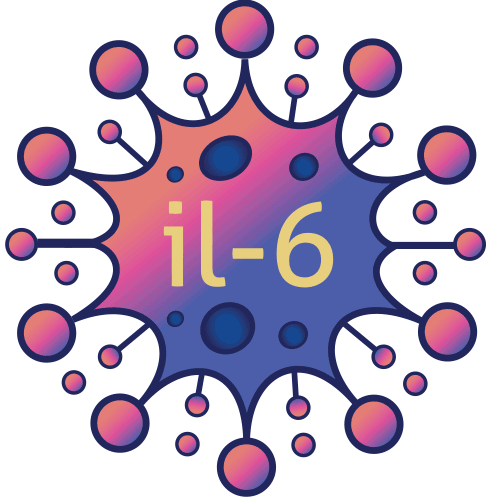Magnesium and Lower IL-6 Levels
- From The Mind of AI

- Nov 17, 2024
- 4 min read
Updated: Nov 19, 2024

Magnesium is an essential mineral involved in over 300 enzymatic reactions in the body, including those regulating muscle and nerve function, blood sugar control, and blood pressure. Importantly, magnesium plays a key role in reducing inflammation and controlling the levels of Interleukin-6 (IL-6), a pro-inflammatory cytokine linked to numerous health issues.
Magnesium’s anti-inflammatory properties are particularly relevant for mental health conditions like PTSD, bipolar disorder, and anxiety, as well as for cardiovascular health, sleep quality, and stress management.
Magnesium and Its Impact on IL-6 Levels
Magnesium's Impact on IL-6 Levels | Description |
Anti-Inflammatory Action | Magnesium helps regulate the immune system by reducing the production of pro-inflammatory cytokines, including IL-6. Magnesium deficiency can lead to higher IL-6 levels, increasing inflammation and contributing to conditions like heart disease, diabetes, and mental health disorders. |
Stress Regulation | Magnesium helps control the body's stress response by regulating the HPA axis, reducing cortisol and IL-6 levels. This makes magnesium beneficial for managing chronic stress, PTSD, and anxiety. |
Mood and Emotional Regulation | Magnesium supports GABA function, a neurotransmitter that calms the brain and reduces neuroinflammation. This makes magnesium helpful for depression, bipolar disorder, and anxiety, which are often linked to elevated IL-6 levels. |
Cardiovascular Health | By reducing IL-6, magnesium helps prevent arterial inflammation, reducing the risk of heart disease, arterial stiffness, and high blood pressure. Adequate magnesium levels can improve overall cardiovascular function. |
Types of Magnesium and How They Affect Health
Type of Magnesium | Primary Health Benefits |
Magnesium Citrate | High bioavailability; used for digestive health and constipation relief. It supports reducing inflammation by lowering IL-6 levels and improving gut function. |
Magnesium Glycinate | Known for its calming properties; ideal for stress reduction, anxiety, and improving sleep quality. It is gentle on the stomach and highly absorbable, making it great for long-term use to reduce inflammation and improve mood. |
Magnesium Threonate | Crosses the blood-brain barrier, making it especially beneficial for cognitive function, memory, and reducing neuroinflammation. Useful for individuals with mental health conditions or age-related cognitive decline. |
Magnesium Malate | Best for energy production and muscle health. It is commonly recommended for individuals with fibromyalgia or chronic fatigue due to its ability to reduce inflammation and support cellular energy. |
Magnesium Oxide | Primarily used for indigestion and constipation. Has lower bioavailability compared to other forms and is less effective for reducing inflammation or supporting mental health. |
Magnesium Sulfate (Epsom Salt) | Used in bath soaks to relieve muscle tension, reduce stress, and promote relaxation. Magnesium is absorbed through the skin and can help lower inflammation and ease muscle pain. |
Different Ways to Incorporate Magnesium into Your Life
Method of Incorporating Magnesium | Description |
Magnesium-Rich Foods | Include magnesium-rich foods like leafy greens (spinach, kale), nuts and seeds (almonds, pumpkin seeds), whole grains (brown rice, quinoa), legumes (black beans, lentils), fatty fish (salmon, mackerel), and dark chocolate in your daily diet. This helps maintain adequate magnesium levels, supporting inflammation control and mental well-being. |
Magnesium Supplements | For those with insufficient dietary intake, magnesium supplements such as magnesium glycinate or magnesium citrate provide a reliable option. Recommended dosages range from 200-400 mg per day. Always consult with a healthcare provider before starting supplementation. |
Magnesium Baths (Epsom Salt) | Soaking in an Epsom salt bath (magnesium sulfate) allows magnesium to be absorbed through the skin, helping to relieve muscle tension, reduce stress, and promote relaxation. Regular baths can also lower inflammation and stress levels. |
Topical Magnesium (Ointments and Sprays) | Use magnesium oils, creams, or sprays applied directly to the skin for localized pain relief, muscle cramps, and to help reduce inflammation. This is a good option for those who have digestive sensitivities or want targeted relief. |
Start Your Day with Magnesium-Rich Smoothies | Blend spinach, almond butter, and banana for a delicious, nutritious breakfast that boosts your magnesium intake while providing energy and reducing inflammation. |
Magnesium Supplements Before Bed | Taking magnesium glycinate at night can promote relaxation and help with sleep quality. It's an easy way to incorporate magnesium to reduce stress and improve overall well-being. |
Magnesium-Rich Snacks | Keep nuts, seeds, and dark chocolate on hand for magnesium-rich snacks that satisfy hunger and improve magnesium intake throughout the day. |
Magnesium Sprays for On-the-Go Relief | Use topical magnesium sprays for quick relief from muscle cramps or soreness after workouts or during high-stress periods. |
Conclusion
Magnesium is essential for reducing IL-6 levels and supporting mental and physical health. Its anti-inflammatory properties help manage conditions such as PTSD, bipolar disorder, mood disorders, and heart disease by regulating inflammation and calming the nervous system. Incorporating magnesium through food, supplements, topical applications, and Epsom salt baths can significantly enhance overall well-being and reduce chronic inflammation.
Whether it’s through magnesium-rich foods or supplementation, ensuring adequate intake can have a profound impact on mental health, stress reduction, and inflammatory control.
Always consult a healthcare provider before adding magnesium supplements to your routine, especially if you have existing health conditions or take medications.




Comments